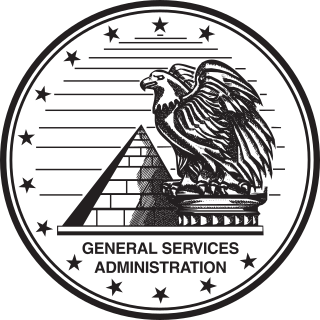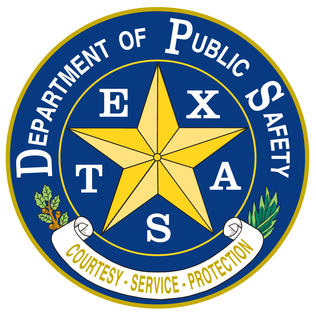
The General Services Administration (GSA) is an independent agency of the United States government established in 1949 to help manage and support the basic functioning of federal agencies. GSA supplies products and communications for U.S. government offices, provides transportation and office space to federal employees, and develops government-wide cost-minimizing policies and other management tasks.

The Bureau of Overseas Buildings Operations (OBO) is a US Government agency that directs the worldwide overseas building program for the United States Department of State and the U.S. Government community serving abroad.

The Department of Public Safety of the State of Texas, commonly known as the Texas Department of Public Safety (DPS), is a department of the state government of Texas. The DPS is responsible for statewide law enforcement and driver license administration. The Public Safety Commission oversees the DPS. However, under state law, the Governor of Texas may assume command of the department during a public disaster, riot, insurrection, formation of a dangerous resistance to enforcement of law, or to perform his constitutional duty to enforce law. The commission's five members are appointed by the governor and confirmed by the Texas Senate, to serve without pay for staggered, six-year terms. The commission formulates plans and policies for enforcing criminal, traffic and safety laws, preventing and detecting crime, apprehending law violators, and educating citizens about laws and public safety.

The Texas Historical Commission is an agency dedicated to historic preservation within the U.S. state of Texas. It administers the National Register of Historic Places for sites in Texas.

The Texas Department of Transportation is a Texas state government agency responsible for construction and maintenance of the state's immense state highway system and the support of the state's maritime, aviation, rail, and public transportation systems. TxDOT previously administered vehicle registration prior to the creation of the Texas Department of Motor Vehicles in November 2009.

The Wisconsin Department of Transportation (WisDOT) is a governmental agency of the U.S. state of Wisconsin responsible for planning, building and maintaining the state's highways. It is also responsible for planning transportation in the state relating to rail, including passenger rail, public transit, freight water transport and air transport, including partial funding of the Milwaukee-to-Chicago Hiawatha Service provided by Amtrak.

The Michigan Department of Natural Resources (DNR) is the agency of the state of Michigan charged with maintaining natural resources such as state parks, state forests, and recreation areas. It is governed by a director appointed by the Governor and accepted by the Natural Resources Commission. Currently the Director is Daniel Eichinger. The DNR has about 1,400 permanent employees, and over 1,600 seasonal employees.
In the United States, compliance requirements are a series of directives United States federal government agencies established that summarize hundreds of federal laws and regulations applicable to federal assistance. They are currently incorporated into the OMB A-133 Compliance Supplement, which was created by the US Office of Management and Budget (OMB).

The Oklahoma State Bureau of Investigation (OSBI) is an independent state law enforcement agency of the government of Oklahoma. The OSBI assists the county sheriff offices and city police departments of the state, and is the primary investigative agency of the state government. OSBI works independent of the Oklahoma Department of Public Safety to investigate criminal law violations within the state at the request of statutory authorized requesters. The OSBI was created in 1925 during the term of Governor Martin E. Trapp.

The Texas Department of Criminal Justice (TDCJ) is a department of the government of the U.S. state of Texas. The TDCJ is responsible for statewide criminal justice for adult offenders, including managing offenders in state prisons, state jails, and private correctional facilities, funding and certain oversight of community supervision, and supervision of offenders released from prison on parole or mandatory supervision. The TDCJ operates the largest prison system in the United States.

The 2007 Texas Constitutional Amendment Election took place 6 November 2007.

The Oklahoma Department of Central Services (DCS) was an agency of the government of Oklahoma which was dissolved in 2011. DCS was responsible for providing services to help manage and support the basic functioning of all state agencies. DCS provides government-wide purchasing, supplying, operation, and maintenance of state property, buildings, and equipment, and for the sale of surplus items. DCS also manages the state motor vehicle fleet and provides government-wide risk management, printing and distribution, and strategic financial and administrative support.

The government of Vermont is a republican form of government modeled after the Government of the United States. The Constitution of Vermont is the supreme law of the state, followed by the Vermont Statutes. This is roughly analogous to the Federal United States Constitution, United States Code and Code of Federal Regulations respectively. Provision is made for the following frame of government under the Constitution of the State of Vermont: the executive branch, the legislative branch, and the judicial branch. All members of the executive and legislative branch serve two-year terms including the governor and senators. There are no term limits for any office.

The Texas Music Office (TMO) is a state-funded business promotion office and information clearinghouse for the Texas music industry. It is headquartered in the State Insurance Building in Austin.
The Texas Department of Agriculture (TDA) is a state agency within the state of Texas, which is responsible for matters pertaining to agriculture, rural community affairs, and related matters. It is currently headed by Agriculture Commissioner Sid Miller, a Republican, who was reelected to a 3rd term in 2022.
The statutory and fiduciary mandate of the State Board of Administration of Florida (SBA) is to invest, manage and safeguard assets of the Florida Retirement System (FRS) Trust Fund as well as the assets of a variety of other funds. The SBA manages 25 different investment funds and trust clients.

The Texas General Land Office (GLO) is a state agency of the U.S. state of Texas, responsible for managing lands and mineral rights properties that are owned by the state. The GLO also manages and contributes to the state's Permanent School Fund. The agency is headquartered in the Stephen F. Austin State Office Building in Downtown Austin.
The Florida Department of Management Services (DMS) is the business arm of Florida government with the primary mission to support sister agencies and current and former state employees with workforce- and business-related functions so they can focus on their core missions as defined in law. The agency's motto is We Serve Those Who Serve Florida.
The Texas Juvenile Justice Department (TJJD) is a state agency in Texas, headquartered in the Braker H Complex in Austin.
The North Carolina Department of Administration was established in 1957 and authorized by North Carolina General Statute 143B, Article 9, Paragraph 143B-366. The department provides business management to the North Carolina government. NCDOA is one of the ten cabinet level agencies. It oversees government operations including facilities construction, purchasing goods, contracting for services, and managing property.














